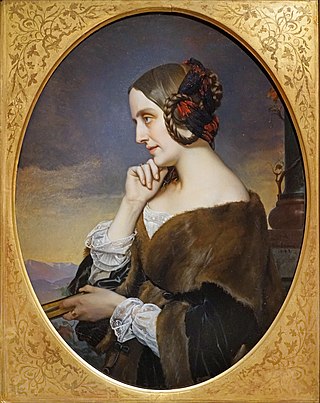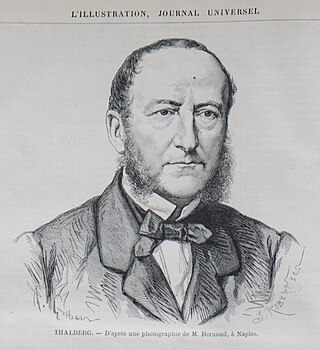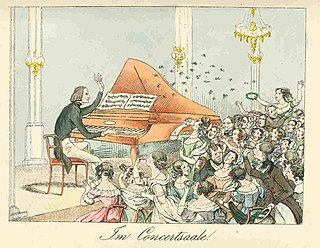
Franz Liszt was a Hungarian composer, virtuoso pianist, conductor and teacher of the Romantic period. With a diverse body of work spanning more than six decades, he is considered to be one of the most prolific and influential composers of his era, and his piano works continue to be widely performed and recorded.

Carl Czerny was an Austrian composer, teacher, and pianist of Czech origin whose music spanned the late Classical and early Romantic eras. His vast musical production amounted to over a thousand works and his books of studies for the piano are still widely used in piano teaching. He was one of Ludwig van Beethoven's best-known pupils and would later on be one of the main teachers of Franz Liszt.

Marie Catherine Sophie, Comtesse d'Agoult, was a French romantic author and historian, known also by her pen name, Daniel Stern.
A virtuoso is an individual who possesses outstanding talent and technical ability in a particular art or field such as fine arts, music, singing, playing a musical instrument, or composition.

Hans Bronsart von Schellendorf was a classical musician and composer who studied under Franz Liszt.

Sigismond Thalberg was an Austrian composer and one of the most distinguished virtuoso pianists of the 19th century.
Totentanz : Paraphrase on Dies irae, S.126, is the name of a work for solo piano and orchestra by Franz Liszt notable for being based on the Gregorian plainchant melody Dies irae as well as for stylistic innovations. It was first planned in 1838, completed and published in 1849, and revised in 1853 and 1859.

The Hungarian State Opera House is a historic opera house located in central Budapest, on Andrássy avenue. Originally known as the Hungarian Royal Opera House, it was designed by Miklós Ybl, a major figure of 19th-century Hungarian architecture. Construction began in 1875, funded by the city of Budapest and by Emperor Franz Joseph I of Austria-Hungary, and the new house opened to the public on the 27 September 1884. Before the closure of the "Népszínház" in Budapest, it was the third largest opera building in the city; today it is the second largest opera house in Budapest and in Hungary.
Franz Liszt wrote drafts for his Concerto for Piano and Orchestra No. 2 in A major, S.125, during his virtuoso period, in 1839 to 1840. He then put away the manuscript for a decade. When he returned to the concerto, he revised and scrutinized it repeatedly. The fourth and final period of revision ended in 1861. Liszt dedicated the work to his student Hans von Bronsart, who gave the first performance, with Liszt conducting, in Weimar on January 7, 1857.

Lewis Henry Lavenu (1818–1859) was an English composer, conductor, musician and impresario.

Après une lecture du Dante: Fantasia quasi Sonata is a piano sonata in one movement, written by Hungarian composer Franz Liszt in 1849. It was first published in 1856 as part of the second volume of his Années de pèlerinage. This work of program music was inspired by the reading of Victor Hugo's poem “Après une lecture de Dante” (1836).

Dreams of Love – Liszt is a Hungarian-Soviet epic musical/drama produced and directed by Márton Keleti, based on the biography of the Hungarian composer and pianist Franz Liszt.

Don Sanche, ou Le château de l'amour, S.1, is an opera in one act composed in 1824–25 by Franz Liszt in his early teen years, with French libretto by Théaulon and de Rancé, based on a story by Jean-Pierre Claris de Florian. For 30 years it was believed to be lost until it was rediscovered in 1903. The first modern performance took place in 1977, 74 years after its rediscovery.
Variation on a Waltz by Diabelli, S.147, is a variation by Franz Liszt composed in 1822 and published in late 1823 or early 1824 as Variation No. 24 of Part II of Vaterländischer Künstlerverein, a collection of variations by 50 composers. All the variations were based on a waltz composed by Anton Diabelli, who also published the work. It was this same invitation from Diabelli to write a variation that inspired Ludwig van Beethoven to write his 33 Diabelli Variations, Op. 120, which formed the entirety of Part I of Vaterländischer Künstlerverein.
Although Franz Liszt provided opus numbers for some of his earlier works, they are rarely used today. Instead, his works are usually identified using one of two different cataloging schemes:

Lisztomania or Liszt fever was the intense fan frenzy directed toward Hungarian composer Franz Liszt during his performances. This frenzy first occurred in Berlin in 1841 and the term was later coined by Heinrich Heine in a feuilleton he wrote on 25 April 1844, discussing the 1844 Parisian concert season. Lisztomania was characterized by intense levels of hysteria demonstrated by fans, akin to the treatment of some celebrity musicians starting in the second half of the 20th century – but in a time not known for such musical excitement.
Mazeppa is a symphonic poem composed by Franz Liszt between the years 1851 to 1854 for orchestra. Mazeppa, S. 100, is the sixth in the cycle of twelve symphonic poems written during Liszt's time in Weimar, however a thirteenth composition was added to his collection in 1882. Mazeppa is based on the poem of the same title written by Victor Hugo in 1829. The work premiered at the Court Theatre in Weimar on April 16, 1854.
Rhondda Gillespie was an Australian-born classical pianist who resided primarily in the United Kingdom and Barbados. She was a specialist in the music of Franz Liszt and brought to light many of his lesser-known works. She was also renowned for her focus on contemporary music, and she gave many world premieres of British music.

Maria Elisabeth, Countess of Schlick was a Bohemia-born composer and poet. She composed music for lieder and also wrote poetry that other composers set to music. She published under the name Countess Elise Schlick or Gräfin Elise Schlick. Although Schlick is often described as German, some sources list her birthplace as Prague and her birth year as 1792.











